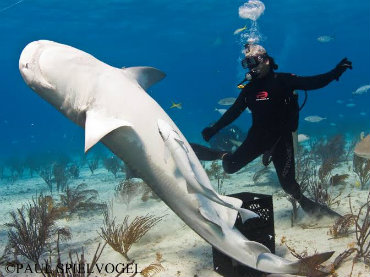- Sections :
- Crime & Public Safety
- Restaurants & Food
- Sports
- More
Categories
Discovery Channel's 'Zombie Sharks' explores tonic immobility

THE WOODLANDS, Texas -- The Discovery Channel launches its 27th season of “Shark Week,” which always takes a bite out of the competition’s regular programming, but aside from the usual shark bait, this year they'll be featuring a show you can really sink your teeth into...Zombie Sharks.
The public’s fascination with sharks hasn’t waned since the 1975 blockbuster Jaws, directed by Steven Spielberg, based on Peter Benchley's novel by the same name.
To the dismay of shark conservationists, Hollywood dove into the deep end with such outrageous productions like Sharknado and Dynoshark, then sunk to new depths with Sharktopus vs Pteracuda (half Pterodactyl, half Barracuda). By instilling a terrifying fear of sharks, the public has adopted the attitude that the only good shark is a dead shark.
Unfortunately countries have seized the opportunity as a result of this fear, decimating the shark population for the sake of their tourist industry or under the guise that soup made from the fins of sharks is considered a delicacy. The human race is eradicating the shark population in such high volume, that it’s seriously damaging the ocean’s delicate eco-system. Read more about the annual mutilation of millions of sharks in Shark diver, photographer offers himself up to further shark conservation.
“Sharks are the ocean’s scavengers. They clean up the ocean,” said Eli Martinez, shark diver and editor of Shark Diver Magazine. “If the sharks are annihilated, who is going to clean up the rotting debris?”
Martinez insists that humans’ fear of sharks is unwarranted.
“Humans are not the shark’s diet of choice, if that were so, there would be more shark bites reported,” said Martinez.
To underscore his point, an average of four shark bites are reported annually, throughout the entire world. Martinez has been diving among the sharks since 1999, and since that time, has worked ardently to demystify the fear of sharks. Over a decade ago (2003), the first issue of Shark Diver Magazine was published, showcasing the interaction of sharks and divers. The beautiful photography, among some of which was shot by Woodlands resident, Paul Spielvogel, garnered a huge following of divers eager to dive with sharks, devoid of cages, or burdened with chain mail suits. The more the divers swam with the sharks, the more they learned about shark behavior. The more they learned, the more scientific information gathered. Marine biologists took note, and the pendulum in film production is swinging in the opposite direction.
The Discovery Channel, who pioneered “Shark Week” featuring the Jaws movie series (which includes Jaws 2, Jaws 3-D, Jaws: The Revenge), helped to create the shark fear phenomena, but is among the first to document the human-shark interaction with a breathtakingly beautiful film that not only dispels the myth, but provides some startling revelations. One such program, Zombie Sharks, featuring Eli Martinez, will air on the Discovery Channel during “Shark Week,” Wednesday, August 13, 9:00 p.m. EDT/8:00 p.m. CDT.
Zombie Sharks explores ‘tonic immobility’ with sharks...a catatonic zombie-like state that can be achieved in sharks, and how predators may be exploiting it to ‘turn the tables,’ making sharks their prey. To better understand the term ‘tonic immobility’, view the video of Eli Martinez explaining the concept, via Skype. For Martinez to grasp the concept himself, he dove with Orcas...the greatest predator in the ocean.
“The Orcas could very well have mastered this technique, enabling them to feast on the Great Whites and other species of shark;” said Martinez.
Thus the reason Orcas are referred to as ‘Killer Whales.’
“The first time I realized I had put a shark in tonic immobility, I immediately looked at my photographer, Paul, as if to say, ‘Did you see that? Did you get that?’ He was just as surprised as I was,” said Martinez.
Martinez began to work more ‘hands on’ with sharks to better explore and understand this phenomena, which is the subject of the program, Zombie Sharks. Heralded as some of the best programming the Discovery Channel will air during “Shark Week,” don’t miss this mystifying interaction with the ocean’s most fascinating creatures, as Martinez and crew demystify the frightening lore surrounding sharks.
Martinez is quick to tell divers not try this at home. Martinez and crew have amassed an unsurmountable number of hours diving with all species of sharks, all over the world. It requires a understanding of each species’ behavior and habits, to be able to dive time and again without mishap.
“The more you dive with them, the more your learn, and the more confident you get,” said Martinez.
To enable the general public to better understand and appreciate the interaction with sharks in a safe environment, Shark Diver Magazine is now taking on a more virtual presentation through the use of video blogs posted to YouTube and Facebook. Become a ‘Friend’ on their Facebook page at the link provided, to show your support for shark conservation. Look for more postings of Martinez as he gets his hands around the subject of tonic immobility with sharks.
Tonic immobility could enable divers and the scientific community, to gain more knowledge of sharks in a safe and effective manner in their own environment. It may also be nature’s way of controlling their numbers, eliminating the need for humans to do so.
'Shark Week' is August 10 - 16
The public’s fascination with sharks hasn’t waned since the 1975 blockbuster Jaws, directed by Steven Spielberg, based on Peter Benchley's novel by the same name.
To the dismay of shark conservationists, Hollywood dove into the deep end with such outrageous productions like Sharknado and Dynoshark, then sunk to new depths with Sharktopus vs Pteracuda (half Pterodactyl, half Barracuda). By instilling a terrifying fear of sharks, the public has adopted the attitude that the only good shark is a dead shark.
Unfortunately countries have seized the opportunity as a result of this fear, decimating the shark population for the sake of their tourist industry or under the guise that soup made from the fins of sharks is considered a delicacy. The human race is eradicating the shark population in such high volume, that it’s seriously damaging the ocean’s delicate eco-system. Read more about the annual mutilation of millions of sharks in Shark diver, photographer offers himself up to further shark conservation.
“Sharks are the ocean’s scavengers. They clean up the ocean,” said Eli Martinez, shark diver and editor of Shark Diver Magazine. “If the sharks are annihilated, who is going to clean up the rotting debris?”
Martinez insists that humans’ fear of sharks is unwarranted.
“Humans are not the shark’s diet of choice, if that were so, there would be more shark bites reported,” said Martinez.
To underscore his point, an average of four shark bites are reported annually, throughout the entire world. Martinez has been diving among the sharks since 1999, and since that time, has worked ardently to demystify the fear of sharks. Over a decade ago (2003), the first issue of Shark Diver Magazine was published, showcasing the interaction of sharks and divers. The beautiful photography, among some of which was shot by Woodlands resident, Paul Spielvogel, garnered a huge following of divers eager to dive with sharks, devoid of cages, or burdened with chain mail suits. The more the divers swam with the sharks, the more they learned about shark behavior. The more they learned, the more scientific information gathered. Marine biologists took note, and the pendulum in film production is swinging in the opposite direction.
The Discovery Channel, who pioneered “Shark Week” featuring the Jaws movie series (which includes Jaws 2, Jaws 3-D, Jaws: The Revenge), helped to create the shark fear phenomena, but is among the first to document the human-shark interaction with a breathtakingly beautiful film that not only dispels the myth, but provides some startling revelations. One such program, Zombie Sharks, featuring Eli Martinez, will air on the Discovery Channel during “Shark Week,” Wednesday, August 13, 9:00 p.m. EDT/8:00 p.m. CDT.
Zombie Sharks explores ‘tonic immobility’ with sharks...a catatonic zombie-like state that can be achieved in sharks, and how predators may be exploiting it to ‘turn the tables,’ making sharks their prey. To better understand the term ‘tonic immobility’, view the video of Eli Martinez explaining the concept, via Skype. For Martinez to grasp the concept himself, he dove with Orcas...the greatest predator in the ocean.
“The Orcas could very well have mastered this technique, enabling them to feast on the Great Whites and other species of shark;” said Martinez.
Thus the reason Orcas are referred to as ‘Killer Whales.’
“The first time I realized I had put a shark in tonic immobility, I immediately looked at my photographer, Paul, as if to say, ‘Did you see that? Did you get that?’ He was just as surprised as I was,” said Martinez.
Martinez began to work more ‘hands on’ with sharks to better explore and understand this phenomena, which is the subject of the program, Zombie Sharks. Heralded as some of the best programming the Discovery Channel will air during “Shark Week,” don’t miss this mystifying interaction with the ocean’s most fascinating creatures, as Martinez and crew demystify the frightening lore surrounding sharks.
Martinez is quick to tell divers not try this at home. Martinez and crew have amassed an unsurmountable number of hours diving with all species of sharks, all over the world. It requires a understanding of each species’ behavior and habits, to be able to dive time and again without mishap.
“The more you dive with them, the more your learn, and the more confident you get,” said Martinez.
To enable the general public to better understand and appreciate the interaction with sharks in a safe environment, Shark Diver Magazine is now taking on a more virtual presentation through the use of video blogs posted to YouTube and Facebook. Become a ‘Friend’ on their Facebook page at the link provided, to show your support for shark conservation. Look for more postings of Martinez as he gets his hands around the subject of tonic immobility with sharks.
Tonic immobility could enable divers and the scientific community, to gain more knowledge of sharks in a safe and effective manner in their own environment. It may also be nature’s way of controlling their numbers, eliminating the need for humans to do so.
Comments •

















